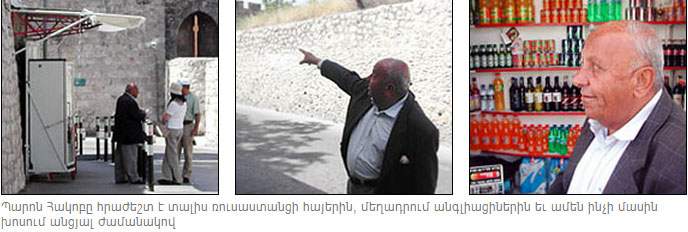
In the Past Tense
Mr. Hakob, a Jerusalem Armenian shopkeeper, is talking to a Russian-Armenian family in front of his kiosk. At first, he didn’t realize they were Armenian, because he heard them speaking Russian, a language as widely used in Jerusalem as in any post-Soviet city. When he learned they were Armenian, he tried to give back the money they had paid him for their juices. They wouldn’t take it, and so Hakob turned to me instead, and started telling me something intended first of all to show the role and influence of the local Armenians. “All the business here used to be in Armenian hands, but now we have nothing. The Armenians who lived here were the smartest people. They owned the markets, the big businesses. There were so many intelligent people around us,” he said. “All the Ford and Mercedes dealerships were owned by Armenians,” he went on, unaware that the Russian-Armenian standing in front of him owned the local Volkswagen dealership.
After the Armenian family from Russia thanked him and left, Hakob and I continued our conversation. I asked him where he had come from. “We local Armenians have been citizens of this city for a long time... Our ancestors grew up here, thank God,” the shopkeeper said. He is not from a family that migrated during the Genocide, though he doesn’t remember when and why his family came to Jerusalem. He said they had been come here some three hundred years ago, or maybe five hundred years ago, it didn’t make much difference, because, he explained, “There were Armenians living here two thousand years ago. The first Christians were Armenians… of course after Jesus. We have a very old history here.”

Most Jerusalem Armenians are the descendants of families that survived the Genocide. In 1947, at the end of the British reign and a year before the formation of the state of Israel, there were fifteen thousand Armenians in Jerusalem. Today there are about two thousand. One-third of them have Israeli citizenship. The status of the others is uncertain. When Jordan ruled Jerusalem, they were given Jordanian passports, but since 1967, when Israel took Jerusalem again, their status has been up in the air. They’ve kept their Jordanian passports but in fact, they are citizens of nowhere.
Hakob, of uncertain status himself, remembers the period of the British reign with anger and regret: “The English are the ones to blame—they just went off and left us. We were left without a mother and father; today the mother and father of every people is its government. ”
The establishment of the Israeli state brought with it many problems for the local Armenians, leading many of them to leave Jerusalem. The decades-long Arab-Israeli conflict has made peace and development impossible. “We were stuck in the middle. Armenians, Christians, were in a bad situation. All the young people got out of here. I had two brothers and three sisters; they all left.”
Hakob says that he wanted to leave Jerusalem, too but family matters prevented it. He regrets being so far from his relatives and said, “Not everybody who left is happy now.”
Hakob is not alone in the special respect he bears toward the Arabs. “In 1917, the Arabs welcomed Armenians, and we were able to live here. We used to have many good people here, very good people.”
He does not want to say much the period of Jordanian rule, but says that after 1967 they had serious problems with the Israeli government. “Everybody left. This whole market belonged to Armenians, the officials, the directors of big banks, artists, craftsmen, and other people—they all left.”
Mr. Hakob says that they live in the “houses of the church”. He believes that the church and the people are interconnected: “If it weren’t for us, the church would have no power. It was us, the Armenians who lived here, who owned the land.” For Hakob, the church and the people are one family, and he was very surprised that at one time the Armenian Patriarch hardly recognized his son.
By the way, Hakob is very proud of own sons. “Kocharyan and my son have been in the same hotel,” he told me. I didn’t ask when or why. The Jerusalem shopkeeper continued, “He also sat with the Catholicos of All Armenians. “That the Catholicos has come to Jerusalem is O.K. for us; it’s important that they don’t forget us.”
The fear of being forgotten is understandable, when you see that the number of Armenians here has decreased more than seven times, and the aged shopkeeper, if you noticed, talks about everything in the past tense.
 Videos
Videos Photos
Photos
Write a comment